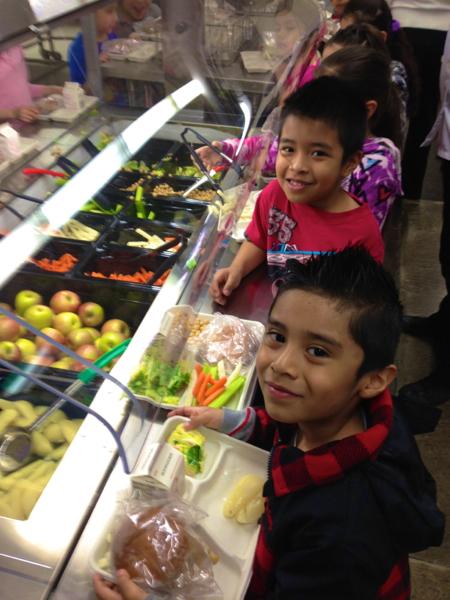Did you know that Minneapolis Public Schools (MPS) is buying free-range, hormone-free turkey from Ferndale market, carrots and red potatoes from the Hmong American Farmers Association, squash from L & R Produce, and kale from Gardens of Eagan?
Farm-to-school is booming at Minneapolis Public Schools, thanks to an innovative new partnership with the University of Minnesota. The university's On-Farm Good Agricultural Practices (GAPs) Education Program and the Minneapolis Public School Culinary & Nutrition Services are teaming up to provide training and technical assistance to farmers selling to MPS for the school meal program in an effort to boost the amount of fresh, local produce MPS can procure.
It all started two years ago, when MPS began buying large quantities of fresh produce directly from farmers for use in their school meals. While the produce was delicious, MPS quickly realized that they needed to provide some standard, hands-on training to the farmers who were supplying the food.

For small farmers, selling to a large wholesale customer like MPS can be challenging, and quite different than a farmers’ markets or restaurant. Given its scale of operation (40,000 meals a day), MPS and their vegetable processor partner Russ Davis Warehouse require that vegetables be graded into sizes and packed in certain industry-standard boxes. Given that young children will be eating the food, best practices for harvest, washing, storing and transporting produce to reduce the likelihood of contamination must be followed.
That where the partnership comes in — thanks to a grant from the Healthy Foods Healthy Lives Institute, the UMN On-farm GAPs team is providing hands-on assistance and mini-grants to all the farmers selling to MPS to help them with their on-farm food safety — things like small grants to build portable handwashing stations, help developing their food safety plans, training their employees on their policies, or developing washing and sanitation protocols for their harvest totes. Russ Davis Warehouse, the processor that receives the fresh produce, held a workshop to walk farmers through exactly what they were looking for in terms of sizing, ripeness, packing and more.
MPS hopes to more than double the amount of locally grown vegetables purchased through its Farm to School program this season. By learning and understanding MPS’ vendor requirements, farmers will be better suited to enter not only the K-12 market, but also other new markets like hospitals, grocery stores, and other institutions that may want to purchase fresh, locally grown produce. That means all those tasty vegetables won't just end up in school lunches, they'll also be on hospital trays and in shopping carts.

The project will also connect students with the farmers who grow food for their school meals — in the fall, farmers will be invited to speak to classrooms and at lunch about their farms and the fresh vegetables the students are eating.
Watch for more updates as UMN and MPS work closely with farmers over the summer months. With programs like these, farmers get more training, schools and other institutions get more fresh and safe food, and in the end, we all benefit.
Click here for more information on the MPS Farm to School program. Click here for more information on the UMN’S On-Farm GAPs Education Program.
 Annalisa Hultberg is a Research Fellow at the University of Minnesota in the On-Farm GAPs Education Program, where she provides outreach and education regarding GAPs and on-farm food safety for fruit and vegetable farmers in the region. She also provides farm to school consulting services to school districts and charter schools in the Twin Cities area. She lives in Minneapolis with her daughter and husband, and loves to eat, cook, and garden.
Annalisa Hultberg is a Research Fellow at the University of Minnesota in the On-Farm GAPs Education Program, where she provides outreach and education regarding GAPs and on-farm food safety for fruit and vegetable farmers in the region. She also provides farm to school consulting services to school districts and charter schools in the Twin Cities area. She lives in Minneapolis with her daughter and husband, and loves to eat, cook, and garden.
 Andrea Northup is the Farm to School Coordinator in the Culinary & Nutrition Services department at Minneapolis Public Schools. In addition to sourcing food for school meals from small farmers in the region, she spearheads a variety of educational programs and community partnerships related to food, nutrition and agriculture. Prior to moving to the Midwest, she founded and directed the DC Farm to School Network in Washington, DC. Andrea graduated from Tufts University in Boston, MA with dual degrees in Environmental Engineering and Community Health. She also enjoys baking, rock climbing and live music.
Andrea Northup is the Farm to School Coordinator in the Culinary & Nutrition Services department at Minneapolis Public Schools. In addition to sourcing food for school meals from small farmers in the region, she spearheads a variety of educational programs and community partnerships related to food, nutrition and agriculture. Prior to moving to the Midwest, she founded and directed the DC Farm to School Network in Washington, DC. Andrea graduated from Tufts University in Boston, MA with dual degrees in Environmental Engineering and Community Health. She also enjoys baking, rock climbing and live music.

